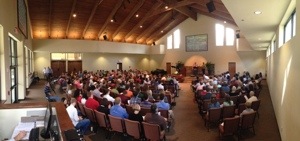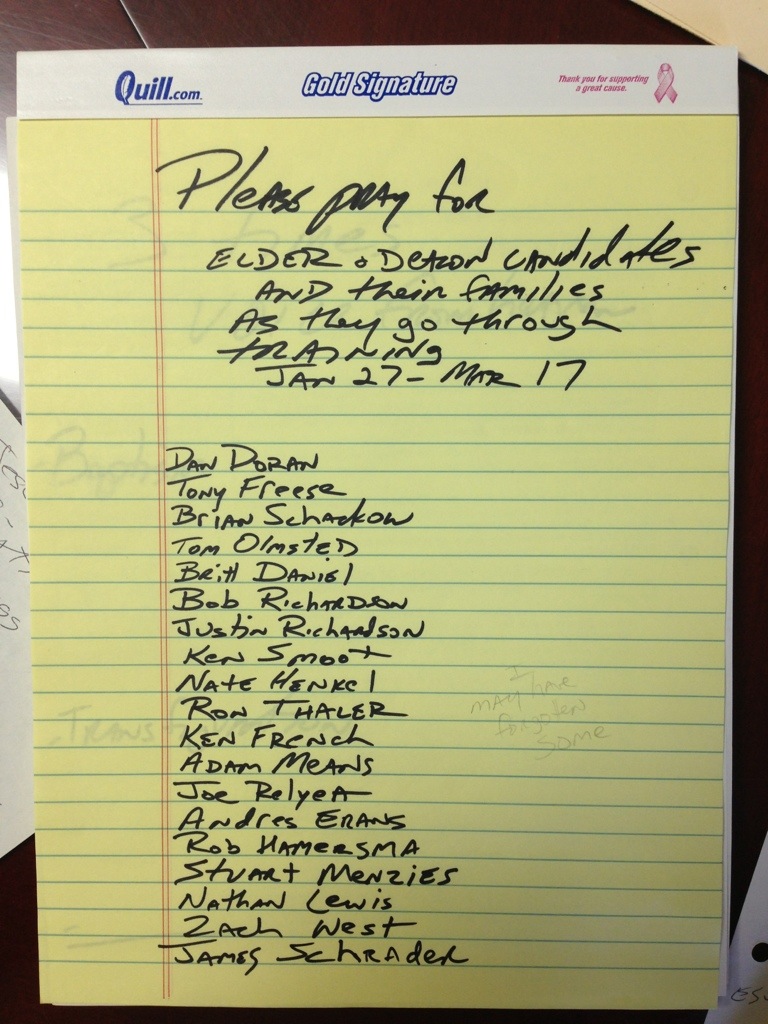RP: Came across this the other day at Langham Partnership, an organization carrying out the vision of John Stott—for all of life under the Lord of all. The highlites below are mine.
By Nathan Clarke and Corey Widmer
If you are a churchgoer, you have probably attended a worship service in which all the Sunday school teachers are acknowledged, thanked, and prayed for. A friend of mine told me about a teacher in one church who was offended by this experience. Surprised, my friend asked her why. She replied, “I spend an hour a week teaching Sunday school, and they haul me up to the front to pray for me. The rest of the week I am a full-time teacher, and the church has not prayed for me once.”
In general, the church has done a fine job equipping Christians for the “private” areas of their lives: prayer, morality, family life, and so on. However, in general, the church has done a poor job equipping people for the “public” parts of their lives: namely, their work, their vocation. The reality is, most people spend the majority of their time in this latter, “public” area.
The teacher’s comment was an important rebuke. When we as the church fail to honor Christians’ work in the world as service or mission unto God, we communicate that what a person spends the majority of their time doing in the world is not nearly as important as what they spend a very small amount of time doing within the church.
The bifurcation of public and private has tremendous consequences. It results in compromise: if Christians aren’t taught to understand how the gospel shapes their public lives, their lives will inevitably be shaped by a different worldview. It results in marginalization: restricting our faith to the private sphere limits our influence in the places of culture that really matter. And it results in disillusionment: Christians who don’t believe there is any real point to their work (other than to make money to give to the church) will become disenchanted and cynical about their jobs.
In response to this concern, a group of us in Richmond, Virginia, are hosting a conference in a few weeks called Common Good RVA. Last April, Christianity Today magazine highlighted our city, showcasing the many ways that Christians here are working for the shalom of Richmond: its peace, prosperity, and comprehensive flourishing. Their coverage inspired many of us to continue to explore ways to join the work of God in the metro region. We believe that one of the main ways we can join this work is through our daily vocations. As a pastor, I’m convinced that if Richmond is to better reflect the kingdom of God, it will not be mainly through the church creating better programs, but through ordinary Christians, in every sphere of work in our city, approaching their vocations as those called to ministry and mission, for the glory of God and for the sake of the common good.
Our hope is that the 200-plus attendees of Common Good RVA will have a very different experience from the disgruntled teacher, and instead will leave blessed and empowered for their spiritual work in the public life of the world. —Corey Widmer, co-pastor, East End Fellowship, Richmond
found at : full article from christianitytoday.com
One day the angels came to present themselves before the LORD, and Satan also came with them. JOB 1:6
Satan, leader of the fallen angels, comes like them into full view only in the New Testament. His name means “adversary” (opponent of God and his people), and the Old Testament introduces him as such (1 Chron. 21:1; Job 1-2; Zech. 3:1-2). The New Testament gives him revealing titles: “devil” (diabolos) means accuser (i.e., of God’s people: Rev. 12:9-10); “Apollyon” (Rev. 9:11) means destroyer; “the tempter” (Matt. 4:3; 1 Thess. 3:5) and “the evil one” (1 John 5:18-19) mean what they say; “prince” and “god of this world” point to Satan as presiding over mankind’s anti-God life-styles (John 12:31; 14:30; 16:11; 2 Cor. 4:4; cf. Eph. 2:2; 1 John 5:19; Rev. 12:9). Jesus said that Satan was always a murderer and is the father of lies—that is, he is both the original liar and the sponsor of all subsequent falsehood and deceits (John 8:44). Finally, he is identified as the serpent who fooled Eve in Eden (Rev. 12:9; 20:2). The picture is one of unimaginable meanness, malice, fury, and cruelty directed against God, against God’s truth, and against those to whom God has extended his saving love.
Satan’s deceptive cunning is highlighted by Paul’s statement that he becomes an angel of light, disguising evil as good (2 Cor. 11:14). His destructive ferocity comes out in the description of him as a roaring, devouring lion (1 Pet. 5:8) and as a dragon (Rev. 12:9). As he was Christ’s sworn foe (Matt. 4:1-11; 16:23; Luke 4:13; John 14:30; cf. Luke 22:3, 53), so now he is the Christian’s, always probing for weaknesses, misdirecting strengths, and undermining faith, hope, and character (Luke 22:32; 2 Cor. 2:11; 11:3-15; Eph. 6:16). He should be taken seriously, for malice and cunning make him fearsome; yet not so seriously as to provoke abject terror of him, for he is a beaten enemy. Satan is stronger than we are, but Christ has triumphed over Satan (Matt. 12:29), and Christians will triumph over him too if they resist him with the resources that Christ supplies (Eph. 6:10-13; James 4:7; 1 Pet. 5:9-10). “The one who is in you is greater than the one who is in the world” (1 John 4:4).
Acknowledging Satan’s reality, taking his opposition seriously, noting his strategy (anything, provided it be not biblical Christianity), and reckoning on always being at war with him—this is not a lapse into a dualistic concept of two gods, one good, one evil, fighting it out. Satan is a creature, superhuman but not divine; he has much knowledge and power, but he is neither omniscient nor omnipotent; he can move around in ways that humans cannot, but he is not omnipresent; and he is an already defeated rebel, having no more power than God allows him and being destined for the lake of fire (Rev. 20:10).
from JI Packer’s Concise Theology
Sunday we will, prior to our call to worship, use the following words to help us realize WHO IT IS that bids us come each week.
Q.) WHO IS GOD? A.) God is the creator and sustainer of everyone and everything. He is eternal, infinite, and unchangeable in his power and perfection, goodness and glory, wisdom, justice, and truth. Nothing happens except through him and by his will.
Psalm 86: Among the gods there is none like you, Lord; no deeds can compare with yours. All the nations you have made will come and worship before you, Lord; they will bring glory to your name. For you are great and do marvelous deeds; you alone are God…. You, Lord, are a compassionate and gracious God, slow to anger, abounding in love and faithfulness.
Commentary
God is an eternal, independent being…. He gives being to all creatures…. God is an eternal, unchangeable being…. His being is without any limits. Angels and men have their beings, but then they are bounded and limited;…but God is an immense being that cannot be included within any bounds…. There never was nor shall be time wherein God could not say of himself, ‘I am’…. He is a God that gives being to all things…. He is the Being of beings, subsisting by himself;…‘I am that I am, and as I am, so will I be to all eternity’…. He is infinite in power, sovereign in dominion, and not bounded as creatures are…. He is so strong that he is almighty, he is one to whom nothing is impossible…. He wanteth nothing, but is infinitely blessed with the infinite perfection of his glorious being…self-sufficient, all-sufficient, absolutely perfect…. There is no succession or variation in God, but he is eternally the same…. God ever was, ever is, and ever shall be. Though the manifestations of himself unto the creatures are in time, yet his essence or being never did nor shall be bound up by time. Look backward or forward, God from eternity to eternity, is a most self-sufficient, infinite, perfect, blessed being, the first cause of our being, and without any cause of his own being; an eternal infinite fulness, and possession to himself and of himself. What God is, he was from eternity, and what God is, he will be so to eternity.
Thomas Brooks (1608–1680). An English Puritan preacher, Brooks studied at Cambridge University before becoming rector of a church in London. He was ejected from his post, but continued to work in London even during the Great Plague. He wrote over a dozen books, most of which are devotional in character, The Mute Christian Under the Smarting Rod being the best known.
From “Christ’s Eternal Deity Proved” in The Complete Works of Thomas Brooks, edited by Rev. Alexander Balloch Grosart, Volume 5 (Edinburgh: James Nichol, 1866), 150–157.
Further Reading
“Self-existence”, “Transcendence”, and “Almightiness” in Concise Theology, by J. I. Packer.
Buy the book OR read them online
About This Blog
This blog is one of the primary ways that Christ Community's staff can connect and share information. Look for important updates on our community life here each week.
Visit the CCC Website.
View our Church Calendar.
Subscribe via Email
Reminders & Reflections
Blog Archive
- June 2015
- May 2015
- April 2015
- March 2015
- February 2015
- January 2015
- December 2014
- November 2014
- October 2014
- September 2014
- August 2014
- July 2014
- June 2014
- May 2014
- April 2014
- March 2014
- February 2014
- January 2014
- December 2013
- November 2013
- October 2013
- September 2013
- August 2013
- July 2013
- June 2013
- May 2013
- April 2013
- March 2013
- February 2013
- January 2013
- December 2012
- November 2012
- October 2012
- September 2012
- August 2012
- July 2012
- June 2012
- May 2012
- April 2012
- March 2012
- February 2012
- January 2012
- December 2011
- November 2011
- October 2011
- September 2011
- August 2011
- July 2011
- June 2011
- May 2011


